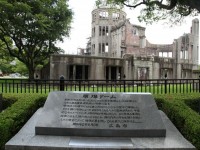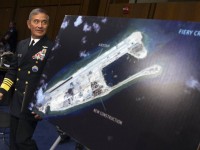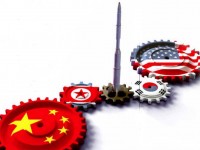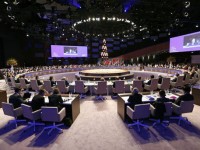- How to Win China’s Aid on North Korea: Stop Forcing Beijing to Choose Between the U.S. and the North
Doug Bandow, Senior Fellow, Cato Institute
Jun 23, 2016
By ignoring the Chinese, Kim Jong-un has been gambling with his regime’s future. The PRC appears more ready than ever before to abandon its troublesome friend. However, inertia—and a cold-hearted assessment of interests—is likely to hold Beijing back from cooperating with the U.S. if forced to choose America over Pyongyang.
Zhou Bo, Senior Fellow, Center for International Security and Strategy, Tsinghua University
Jun 07, 2016
No nuclear-weapon states have given up efforts in modernizing their arsenals, although for different reasons. A commitment of no-first-use is defensive in nature, but it doesn’t exclude nuclear retaliation. Such a pledge doesn’t cripple other countries’ nuclear capabilities: It boosts confidence that a world free of nuclear weapons is eventually possible.
Jin Liangxiang, Senior Research Fellow, Shanghai Institute of Int'l Studies
May 31, 2016
China regards both the U.S. and Iran as important partners, which is why Beijing played a major role in putting together the Iran nuclear deal. Implementing that plan will face challenges in both the U.S. and Iran, and China’s commitment to building a new type of major-country relationship with the US means it will continue to assist both countries to keep the deal moving forward.

Xu Duo, Fox Fellow, Yale University
May 11, 2016
Obama will visit Hiroshima on May 27th when he attends the G7 summit held later this month in Japan. However, the visit may backfire and hurt Japan by touching off an inconvenient chain reaction. By fixating on the nuclear trauma while blotting out recollections of Japan’s victimization of others, Japan’s sense of its role as a victimizer has been weakened.
Richard Weitz, Senior Fellow, Hudson Institute
Apr 20, 2016
With the end of the nuclear security summits and major Russia-U.S. security tensions, China-U.S. nuclear security cooperation is needed more than ever. Fortunately, both governments are pursuing projects to counter nuclear smuggling, reduce the use of dangerous nuclear fuels, and augment other international institutions that counter nuclear terrorism.

Joan Johnson-Freese, Professor, US Naval War College
Apr 15, 2016
The incident between Admiral Harris and the Obama Administration, if there was one, centered on policy. Effectively engaging China at the Nuclear Security Summit was seen much more productive than confronting China with U.S. military might. Offering counsel and then potentially having to implement policy that goes against that counsel is difficult, but a fundamental premise of civil-military relations.

Doug Bandow, Senior Fellow, Cato Institute
Apr 08, 2016
There is little doubt that the so-called Democratic People’s Republic of Korea has lost Chinese public opinion. Doug Bandow argues that it would help if the U.S. and its allies, most obviously the Republic of Korea and Japan, made it easier for Beijing to effectively join America’s anti-Pyongyang coalition.
Fan Jishe, Professor, the Central Party School of Communist Party of China
Apr 08, 2016
Many countries have strengthened the physical protection of nuclear materials and facilities, and stronger regulations have been put into place. Now that the Nuclear Security Summits are said to have served their purpose, it is time to translate political stances into additional concrete measures and investment in nuclear security.
George Koo, Retired International Business Consultant and Contributor to Asia Times
Apr 06, 2016
Through interventionist misadventures in Iraq, Syria, and Libya, the U.S. has been a major contributing factor in the unrest and has proven incapable of maintaining peace and order by its own effort. China has a non-confrontational approach to international relations and can be an effective partner in complementing the U.S. in anti-terrorism efforts.

Zhao Minghao, Professor, Institute of International Studies at Fudan University, and China Forum Expert
Apr 02, 2016
The Fourth Nuclear Security Summit is held in Washington D.C from March 31 to April 1. Personally advocated by United States President Barack Obama, the nuclear summit has been convened once every two years since 2010.
Back to Top

- China-US Focus builds trust and understanding between the U.S. and China through open dialogue among thought leaders.
- Our Offerings
- Topics
- Videos
- Podcasts
- Columnists
- Research Reports
- Focus Digest
- Stay Connected
-
Thanks for signing up!
- Get the latest stories from China-US Focus weekly.